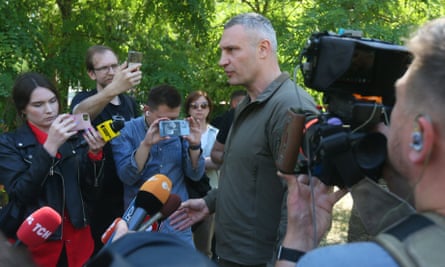When the air raid alarms go off at around 3am, the first things exhausted Kyvians do is reach for their mobile phones, check the news, message family and friends – and start listening to the explosions that almost certainly follow.
“You wake up, go to a safe space, maybe a shelter, holding your phone. You cannot work, you cannot read; you sit and look around and wait. In the worst case, you hear a distinctive noise, maybe like a motorcycle passing by,” said Kira Rudik, a Ukrainian MP and leader of the liberal Holos party.
“You wait to see if the noise is coming closer or getting farther away. You are waiting to see if at the end of the noise there will be an explosion – or nothing at all. And if there’s an explosion you say shit, try to work out where it is, in case somebody you know is close,” she continued.
After the Russian retreat from the boundaries of the capital in the first few weeks of the war, central Kyiv has rarely felt threatened by bombing – until the past month. During the winter there were attacks on the city’s power and utility networks, mostly in industrial locations, but now missile and drone strikes are landing on or near homes.
This week alone there have been six consecutive nights and one day of bombing. Air raid sirens, once ignored, partly because they went off all the time, now bring real fear, unless a person has been able to sleep through them. Eventually an all-clear will be announced, confirming the end of the danger, typically two hours after the raid began.
Almost all – more than 90% – of the missiles and drones are blocked by Ukraine’s air defences, led by the US-made Patriot system, which the Russians are desperate to knock out. But even so, falling debris can be deadly, as it proved in the small hours of Thursday when three people including a nine-year-old child were killed in the north-eastern suburb of Desnyanskyi.
That night Maria Hlazunova, 31, a communication manager at the Ukrainian War Archive, was awake again. “I was so worried when I worked out where the missile had landed as it was in the district where my family is. I called my brother immediately, he too was awake, and he said, as everybody does in Kyiv who is safe: ‘Oh I’m fine’.”
In some cases there is little time to prepare. While slow-flying Iranian-made Shaheed drones emit a distinctive motorbike or lawnmower sound – widely shared on WhatsApp – the Iskander ballistic missiles that struck Kyiv are so fast there may only be five minutes’ warning once they enter Ukraine’s airspace from Belarus.
The three who died on Thursday were waiting outside an unopened bomb shelter, prompting recriminations between President Volodymyr Zelenskiy and the city’s mayor, Vitali Klitschko. Zelenskiy accused Klitschko of negligence, while the mayor complained that bomb shelters were underfunded. But the speed at which the missile fragment landed also caught people by surprise.

Most people do not rely on bomb shelters and have their own strategies, such as the theory of “two walls”, where a person hides in the centre of a building with a pair of walls between them and the outside world. For Rudik, the family uses the broom cupboard under the stairs; for Hlazunova, it is in the corridor, where she tries to calm her cats.
Casualties have been low given the intensity of the bombing – nobody was reported hurt on Friday night, for example – but Hlazunova says the routine of being woken “at 3am, plus or minus one hour” comes just as most people are hoping for deep sleep.
“I think they are aiming for a form of psychological terror through exhaustion,” she says, although, tiredness apart, it is having no significant effect on Kyvians’ support for the war. Morning meetings routinely get pushed into the afternoon as people hope, but often fail, to get extra sleep.
Not having enough rest, people become grumpy. Rudik relates getting into a row with another driver over a car parking space. Cross words were exchanged, then each driver got out, but the situation was suddenly defused when the other man said to her: “‘We probably haven’t had enough sleep have we; we should just go away’. He was right and we just got back into our cars.”
Humour helps. Ukrainians are unable to resist an online meme, sharing them rapidly to keep spirits up. Hlazunova forwards an image of a sad-looking cat surrounded by the words: “I’m so proud of myself. I slept for 8 hours. It took me 3 days, but still.” Rudik meanwhile tweeted out her own grumpy cat picture.
In case you wonder, the air raid sirens are on. This is the pic of a cat in Kyiv subway, that is used as a bombshelter now. This is how we all feel. pic.twitter.com/eES40Pst8P
— Kira Rudik (@kiraincongress) June 1, 2023
The tabby cat, called Chloe, was photographed swaddled in a pink blanket in a Kyiv subway looking regally irritated. “In case you wonder, the air raid sirens are on,” the MP wrote, before focusing on the cat: “This is how we all feel.”

